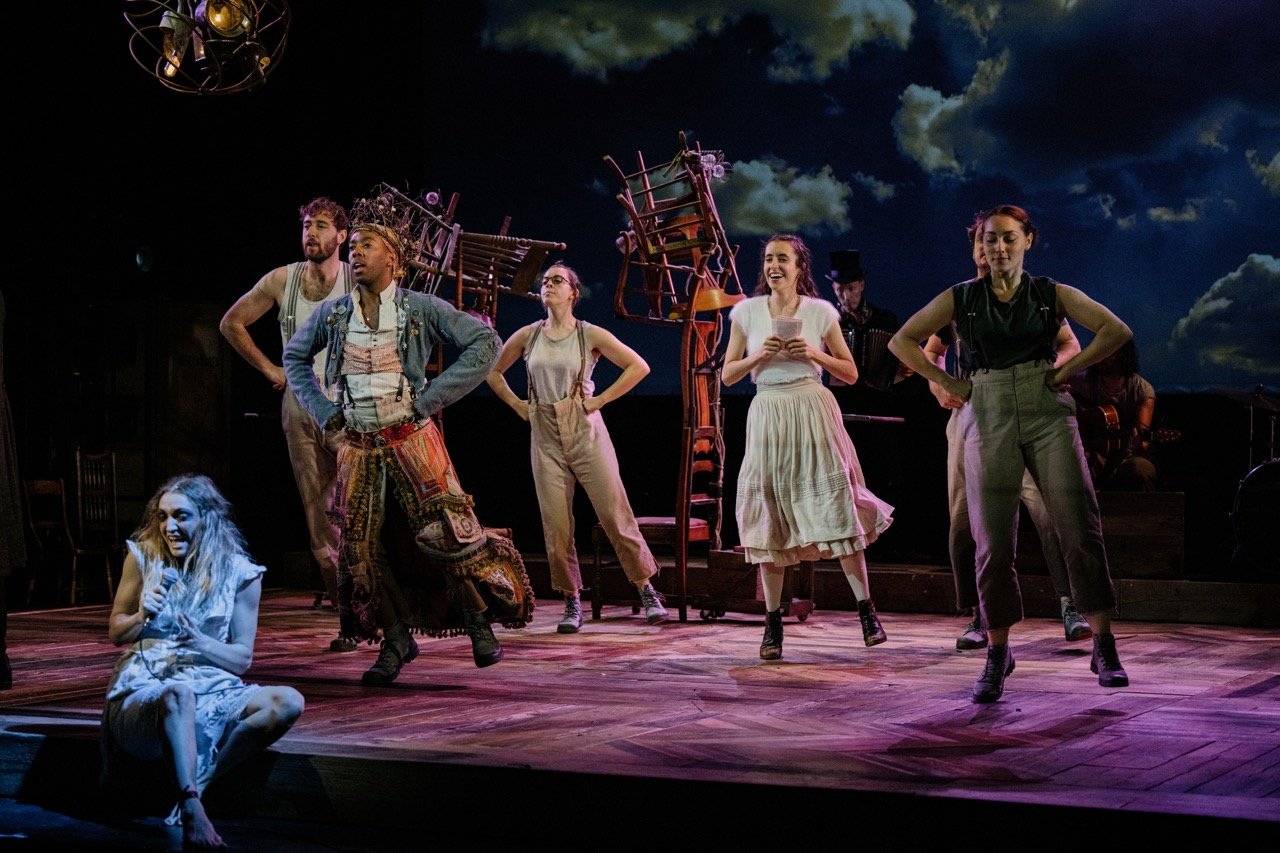Wuthering Heights
“If you want romance, go to Broadway,” the chorus of Wuthering Heights informs the audience. These talented performers are speaking – well, singing – the truth. Emma Rice’s audacious adaptation of Emily Bronte’s gothic novel is wildly entertaining, featuring song, dance, puppetry and violence, but romance is not included.
It’s clear from the first moments that Rice’s adaptation makes no pretenses about its irreverence, when Lockwood (Sam Archer), venturing through the rain to call on his landlord Heathcliff (Liam Tamne) is almost blown across the stage in comically overstated physicality. The cheerful tenant is bewildered by his surly proprietor and miserably stoic family, inspiring the Moors (which are played by actors) to tell him the tale of the unhappy families and their adjoining homes.
Bronte’s novel utilized the frame story technique, narrating its story through several points of views. In Rice’s production, the Leader of the Yorkshire Moors (Nandi Bhebhe) serves as the narrator while the Moors are the Greek chorus, chronicling and commenting on the tale of tormented love to Lockwood. When he laments that the intertwining families prove difficult to keep track of — “Everyone’s related, all the names sound the same” — the Moors helpfully provide namecards.
The production has the feeling of a pantomime, its unabashed theatricality on full display. The props for Vicki Mortimer’s set are assembled throughout scenes, a ladder represents an entire mountain, children are played by puppets, and performers comment on the action while seated on chairs surrounding the stage. The subtle video projections by Simon Baker and the onstage band playing Ian Ross’s music provide brooding atmosphere to accompany the story.
But despite all its embellishments, or perhaps because of them, Wuthering Heights never registers as a human story, Heathcliff and Cathy as people we should be rooting for. Played by Lucy McCormick, Cathy is a rebellious, wild, and, at times, sullen girl. McCormick embodies her restless spirit and her longing for freedom, while her and Heathcliff’s adventures and explorations are cleverly staged with the use of a few pieces of cloth and some chairs. Frustration and feeling like an outsider are what connect Cathy and Heathcliff, but that connection never emotes as a tortured, forbidden romance, and Cathy’s confessional speech to the Lead Moore, in which she declares, “Heathcliff is more myself than I am,” contains none of the euphoria or torture such a love inevitably inspires.
Cathy is hardly a romantic heroine. Rebellious and restless, she is selfish and a careless wife to her husband. Seeing her treat those around her with casual cruelty, one has to wonder why Heathcliff and Linton are both so infatuated with her. Dressed in raggedly casual clothing, her blonde hair windswept and uncombed, McCormick certainly looks the part, and, when Cathy bursts into a screaming rock song, proclaiming, “I am the earth,” it’s clear this woman is not meant to be anyone’s wife.
Wuthering Heights shocked Bronte’s readers when the novel was first published, critics decrying its “shocking pictures of the worst forms of humanity” and its “details of cruelty, inhumanity, and the most diabolical hate and vengeance”. Cathy herself was equally shocking, this wild young woman defying the standard of a beautiful, delicate victim.
Her intensity can only be met by Heathcliff. Witnessing the cruelty he endures at the hands of Cathy’s brother Hindley (Tama Phethean), who orders him to, “Go back to where you came from,” his thirst for vengeance is almost understandable. Tamne embodies this rage, stalking the stage in dark clothes, his brow furrowed, obsessed with revenge. It is jarring to witness his cruelty as he beats and whips his own family and plots to destroy the lives of those who wronged him, robbing them of everything they hold dear.
One would think this would make for a dreary production, but the sheer theatricality of the supporting cast ensures just the opposite. Playing Cathy’s husband and sister-in-law, Archer and Katy Owen infuse the production with laughter as they perform the dandified pair of Linton and Isabella with absurd propriety. Owen is equally outstanding when she performs Heathcliff’s sickly offspring, Little Linton. The petite actor bursts with energy, bringing humanity and absurdity to both characters. Her Isabella serves as a foil to Cathy’s wild rebellion and tragic death. Isabella’s foppish femininity is crushed by Heathcliff’s deception and cruelty, but rather than resign herself to a life of misery or wither away and die, Isabella escapes, pregnant with Heathcliff’s child, and raises him on her own.
Nandi Bhebhe’s wry wisdom and rich voice are well-employed as the Lead Moore/narrator, providing the audience’s thoughts and questions to the actors, while Phethean excels at both the spiteful Hindley Earnshaw and the kind-hearted Hareton.
He’s a lovely match for Eleanor Sutton’s Young Cathy, her fresh-faced beauty and kindness a welcome change after witnessing the misery Heathcliff has wrought. The two share an innocent chemistry, and their romance offers hope to the conclusion of this tragic story. But while it is a happy ending, it does not feel like one. This sincere, optimistic conclusion seems out of place almost three hours of tragedy, theatricality and camp.


